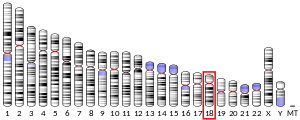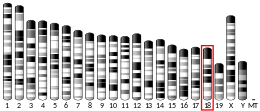Mucosa-associated lymphoid tissue lymphoma translocation protein 1 is a protein that in humans is encoded by the MALT1 gene.[5][6][7] It's the human paracaspase.
- ^ a b c GRCh38: Ensembl release 89: ENSG00000172175 – Ensembl, May 2017
- ^ a b c GRCm38: Ensembl release 89: ENSMUSG00000032688 – Ensembl, May 2017
- ^ "Human PubMed Reference:". National Center for Biotechnology Information, U.S. National Library of Medicine.
- ^ "Mouse PubMed Reference:". National Center for Biotechnology Information, U.S. National Library of Medicine.
- ^ Dierlamm J, Baens M, Wlodarska I, Stefanova-Ouzounova M, Hernandez JM, Hossfeld DK, et al. (June 1999). "The apoptosis inhibitor gene API2 and a novel 18q gene, MLT, are recurrently rearranged in the t(11;18)(q21;q21) associated with mucosa-associated lymphoid tissue lymphomas". Blood. 93 (11): 3601–3609. doi:10.1182/blood.V93.11.3601. PMID 10339464.
- ^ Hosaka S, Akamatsu T, Nakamura S, Kaneko T, Kitano K, Kiyosawa K, et al. (July 1999). "Mucosa-associated lymphoid tissue (MALT) lymphoma of the rectum with chromosomal translocation of the t(11;18)(q21;q21) and an additional aberration of trisomy 3". The American Journal of Gastroenterology. 94 (7): 1951–1954. doi:10.1111/j.1572-0241.1999.01237.x. PMID 10406266. S2CID 188457.
- ^ Akagi T, Motegi M, Tamura A, Suzuki R, Hosokawa Y, Suzuki H, et al. (October 1999). "A novel gene, MALT1 at 18q21, is involved in t(11;18) (q21;q21) found in low-grade B-cell lymphoma of mucosa-associated lymphoid tissue". Oncogene. 18 (42): 5785–5794. doi:10.1038/sj.onc.1203018. PMID 10523859.







